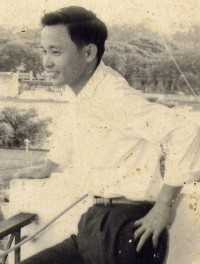Reader as witness
M. JOHN HARRISON
Dave Eggers
WHAT IS THE WHAT
475pp. Hamish
Hamilton. £18.99.
9780241142578
US: McSweeney's. $26.
9781932416640
Valentine Achak Deng watches as two of
his companions are
eaten by a lion. It is night. The lion emerges from the bush, kills a
boy and
drags him away. No one does anything. No one tries to do anything -
except not
hear the boy being eaten - and the lion comes out of the bush again and
eats
another boy. After that, they sleep in a circle. All through the night,
the
boys on the outside of the circle migrate inwards, displacing others.
Acts of witness have complex effects
on the reader, one of
which is a sense of guilty helplessness. In his life. Valentine
has experienced a good
deal of helplessness on behalf of other people, and this somehow
multiplies the number of
acts of witness taking place. By a subtle turnabout he manages to
stand in for, represent
in some way, his own interlocutors: we are. What Is the What
reminds us, teller or
listener, all in the same boat. None of this doubling, which thrusts
us back into the oral
tradition and makes us question what a story - a statement of witness
- actually is, would
be possible without the sophisticated intervention of Dave
Eggers, who in this
deceptive book appears to surrender his voice to the voice of a real
person. Eight or nine years old,
displaced by the second Sudanese civil war, his parents
killed and his
village burned by the murahaleen militias. Valentine Achak Deng finds
himself among the
"Lost Boys", endless lines of starving Dinka children, mostly male,
some naked, all
hungry, who walked through the deserts and forests to safety in Ethiopia,
preyed on by animals,
disease and soldiers. He watches his friends die. He
survives, though he sees and
experiences things we would rather forget, and all it leads
to is ten years in the
wrenching conditions of the Kakuma refugee camp. Later,
in America
at last, grown up, working for a qualification, trying to understand
and come
to terms with the food and art of his adopted nation, he is
pistol-whipped
during a robbery. "In my life", he remarks, "I have been struck
in many ways, but never with the barrel of a gun." His assailant, a
black
Atlantan called Powder, mistakes him for a Nigerian, then, after a
certain loss
of temper and some wild kicking, reduces him almost carefully to
unconsciousness. "When there is pleasure, there is often abandon, and
mistakes are made", observes Valentine; better to be robbed
deliberately
than killed by accident. It is hard to
say whether What Is the What, the result of years of collaboration
between
Eggers and Deng whose story this is, should be described as fiction or
non-fiction. Content has overwhelmed form so completely that the book
is
released to become neither, existing first as a "human document" and
then, paradoxically, as a pure act of writing -
subtle, funny, fluid, elegant, poignantly clear
and honest. The most
demanding part of the task must have been to stand away from the
subject matter
and allow it to breathe. Eggers has been so successful at this that
What Is the
What acts, if nothing else, as a
triumphant rebuttal of Martin Amis's method
for House of Meetings, a book in which the
author's need to add literary value
tended to obscure the
very facts he was writing about.
The art
has gone into throwing
Valentine's s voice. As a result, you receive it unquestioningly as the
voice
of an autobiographer. The only obviously novelistic choice has been to
use
Valentine's experience of being robbed in Atlanta
as a framing device for the cruelties of his life in Sudan.
The ironies that spin off
add to the reader's sense of guilt at not being able to be there for
the Lost
Boy; but they are also the perfect compliment to Valentine's quiet,
sly, Dinka sense of
humour. Not long
after they have settled in the US,
Valentine and his friend Achor Achor decide to watch The Exorcist. "We
have an interest in the concept of evil, I admit it", he says. The film
terrifies them, and Achor cannot even stay in the same room with it. It
would
be a mistake to think that Dave Eggers has given up irony. What he has
done is
to send it deep into the text where it can do its work.
